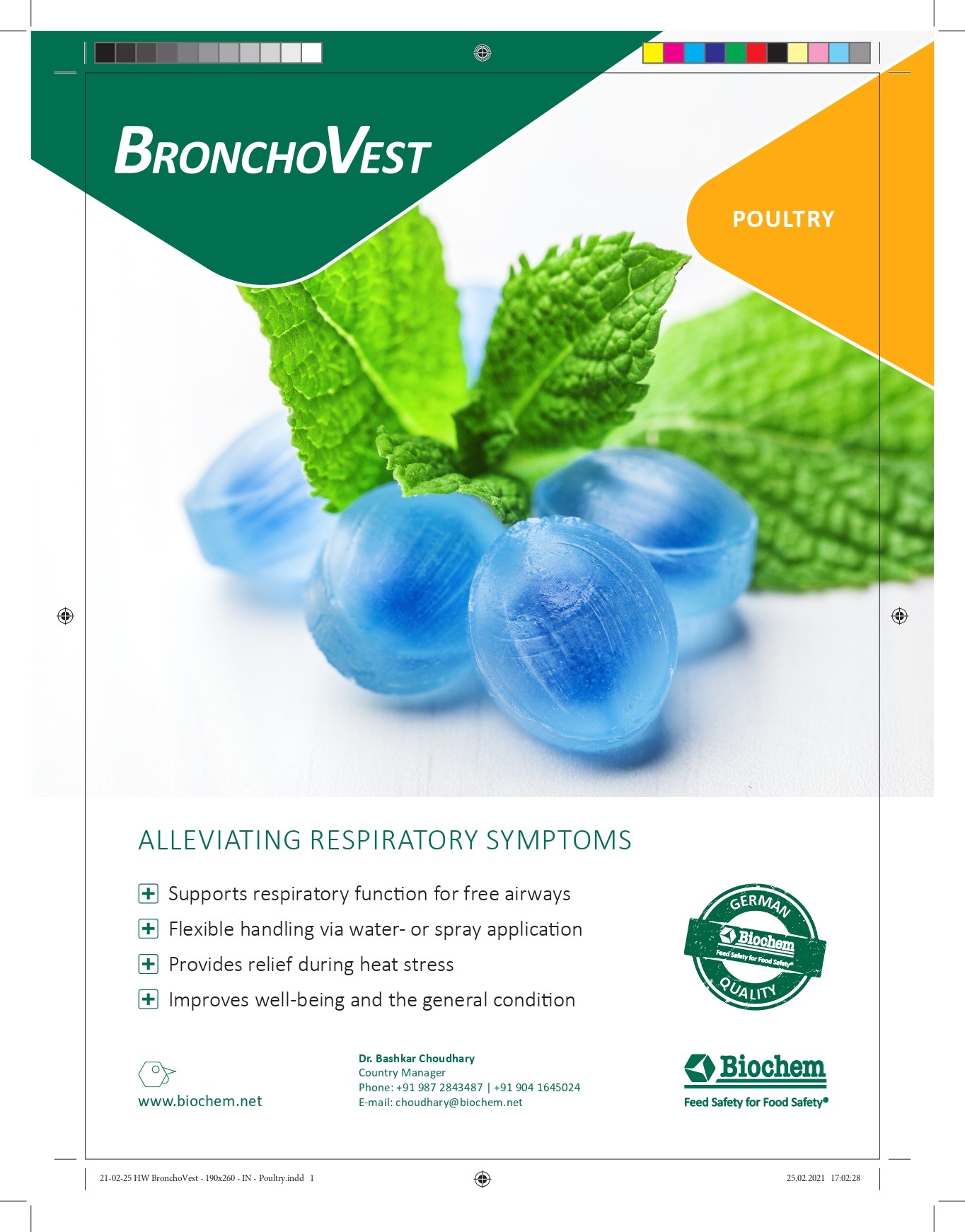The Use of Essentials Oils to Support Respiratory Function in Broilers
Melanie Frisch, Biochem Zusatzstoffe Handels- und Produktionsges. mbH, Lohne, Germany
Essential oils are active ingredients that are derived from plant extracts. They are traditionally known for their positive effects on health. Among the various indications for their use, the application during respiratory challenges in poultry has been proven. In combination with conventional treatments or as a preventive, they can help to alleviate symptoms and facilitate breathing. At the same time, they have demonstrated their antimicrobial activities in several in-vitro studies.
https://www.pashudhanpraharee.com/role-of-essential-oils-as-feed-additive/
Essential oils are water soluble plant extracts that are often made up of different components. Some frequently used essential oils in animal husbandry are for example eucalyptus and peppermint oil, but others such as from oregano, garlic, and aniseed are used as well, to name just a few. These substances are associated with different positive effects, like an antimicrobial activity or a positive influence on respiration and digestion. Sometimes, it is just one of the chemical components of an essential oil which is responsible for its efficacy, therefore it becomes extracted and concentrated. Only the natural essential oils and their extracts show the desired high activity, their synthetic counterparts remain largely ineffective. Some examples of these highly effective components are menthol and 1,8-cineol. The amounts of these concentrated components in an essential oil vary, depending on the origin of the plants they are extracted from, and are critical for determining the quality of supplemental feedstuffs.
In times of a more sensitized discussion of antibiotic use and the emerging of resistant bacteria, using essential oils as alternative or supportive treatment to conventional methods is gaining relevance. This is mirrored in the increased research about the efficacy of essential oils or their components. Most people have already experienced the alleviating effects that menthol has on a stuffy nose, and essential oils have been used in traditional medicine for centuries. In recent years, the beneficial use of essential oils in commercial poultry farming has been examined more closely. A plethora of scientific studies have emerged that show the various positive influences in poultry.
Natural peppermint and eucalyptus oils are commonly used to alleviate respiratory symptoms. They have the ability to thin mucus and thus facilitate its removal from the airways. In combination with their antispasmodic and expectorant properties, the airways are cleared and breathing becomes easier during infection. One of the components of eucalyptus oil, 1,8-cineol, has also shown anti-inflammatory and immune-stimulating effects and reduced panting rates in trials. These effects are also beneficial to the animals during hot and dry summer periods, when increased dust pose an additional burden for the airways and the panting rates increase with rising temperatures.
Menthol is most commonly known for its cooling effect. It activates certain receptors on the mucous membranes, the cold receptors, which creates a cooling effect and fosters a feeling of facilitated air intake. The animals benefit from this effect not only when congested, but also during heat stress situations.
In addition to the various effects on the respiratory systems, many essential oils have also demonstrated antimicrobial properties. Several in vitro studies have shown good inhibitory effects against bacteria, viruses, and fungi. In one study, in which a peppermint solution was fogged in a broiler house, the antimicrobial effects of this essential oil were confirmed
through a reduced bacterial count on surface areas. Many other studies have confirmed the antimicrobial effects of highly concentrated essential oils: they are able to permeate cell membranes and disturb the energy metabolism of the bacterial cell. The strongest effects can be seen against gram-positive bacteria.
In combatting respiratory symptoms, products like BronchoVest
use the combined synergistic effects of these active components. Not only does it alleviate respiratory symptoms, but the antimicrobial effects may also have a positive influence on decreasing pathogen pressure. Especially in virus-related respiratory diseases and when the immune system is challenged during stress situations, damaged mucous membranes are susceptible to bacterial superinfections.
Respiratory ailments in poultry often result in a reduced feed efficiency and can ultimately lead to a reduced performance and higher mortality rates. Animals with an impaired respiratory system show lower oxygen concentrations in the blood, leading to discomfort, a reduced vitality and lowered feed intake. For affected flocks, a treatment with BronchoVest, rich in natural essential oils and effective components menthol and 1,8-cineol, is indicated to support treatment and restore respiratory function.
The application can take place via drinking water with a dosage of 100 to 200 ml BronchoVest per ton of water, ideally starting at the slightest onset of respiratory symptoms, and last for 5 days or until symptoms have disappeared. Another effective method is a spray application, for which 100 to 200 ml BronchoVest are dissolved in 10 liters of fresh, clean water per 20.000 animals and sprayed 2 to 4 times per day. During anticipated peak temperatures, BronchoVest can be given for 3 to 4 days, starting one day prior to heat stress.



